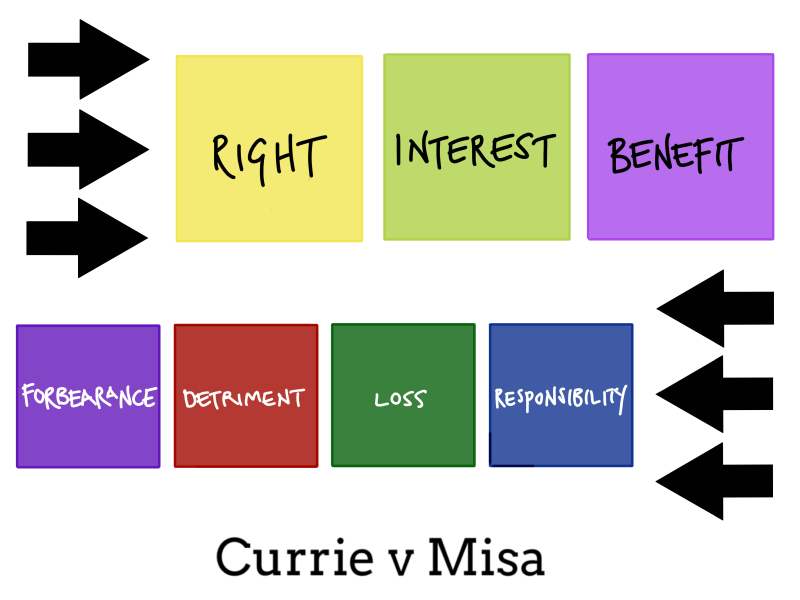Case Summary…the background to Currie v Misa (1876)
Currie v Misa…Misa v Currie? What is a Bill of Exchange? What is consideration?
Consideration can be difficult enough to understand without extra confusion about case names and complicated commercial concepts. So why is the case sometimes known as Currie v Misa (1875) LR 10 Ex 153 and at other times Misa v Currie (1876) 1 App Cas 554?
Well, the famous quote made by Lush LJ, defining consideration as…
‘some right, interest or benefit accruing to the party or some forbearance, detriment, loss or responsibility, given, suffered or undertaken by the other.’
…was made when the case was heard in the Exchequer Chamber as Currie v Misa. When Misa appealed the decision and the case went to the House of Lords it became Misa v Currie. Hence the two different ways of citing the case.

What are the facts of Currie v Misa and what is a Bill of Exchange?
The case involved three parties…
Joseph Javier de Lizardi, the owner of F. de Lizardi & Co, a general merchant.
The claimant Glyn, Mills, Currie, & Co, a bank. Lizardi had been a good customer of the bank for over thirty years.
The partner of the bank who dealt with Lizardi was the wonderfully named Bertram Wodehouse Currie, an enthusiastic collector of French 18th century books, oriental china and works of art, and great-grandson of the man who had established the bank. (Find out more here www.natwestgroup.com/heritage/people/bertram-wodehouse-currie.html)
The defendant M. Misa, Esq. of 41 Crutched Friars, a wholesale wine merchant based in London and Cadiz.
What are Bills of Exchange?
Bills of exchange, which are still used today in international commerce, were used by companies when they needed money in a different city or foreign country where there might not be a branch of their own bank. Rather than travel with cash companies would buy bills of exchange from brokers which they could use to draw down cash when abroad.
What are the facts of Currie v Misa?
Misa buys Bills of Exchange from Lizardi – Misa required foreign currency in Cadiz, the equivalent of 2000l (about £125,500 today) so their agent contacted a bill of exchange broker and purchased four bills of exchange, or drafts, from Lizardi which they could use to draw down Spanish currency (at the time escudos and pesetas) from M. Manuel Paul in Cadiz.
These drafts were dated 11th February 1873. At the time it was customary to pay for bills of exchange on the next postal day (Tuesdays and Fridays) so Misa would have had to pay Lizardi on the following Friday, 14th February. However, the bills were not due (and could therefore not be used by Misa) until 25th February.
Currie becomes concerned about Lizardi’s debts – Meanwhile, back in London, on 12th February Mr Currie had become worried about how withdrawn Lizardi was on his bank accounts. He was overdrawn by 83,436l 13s 8d (about £5,500,000 today). Currie had also become suspicious that the securities Lizardi had deposited for his debt were not valid. He pressed Lizardi to reduce his debt by making a significant payment into his bank account.
Lizardi gives Currie Misa’s debt – On 13th February Lizardi passed on to Currie the payment that Misa owed him as security on his debts. However, the bank was not reassured and later that day stopped honouring Lizardi’s cheques or making payments from his accounts. It was later discovered that Lizardi had absconded and was declared bankrupt owing over £1 million (about £65 million today).
Currie calls in Misa’s debt – On 14th February Currie contacted Misa, payment was due for the bills of exchange which was now owed to Currie. Later that day Misa delivered a cheque to Currie for the amount owed. However, when they discovered that payments were not being made from Lizardi’s account, including the bills of exchange, they contacted their bank to stop the cheque they had made out to Currie. Currie sued Misa for the amount owed.
The legal arguments in Currie v Misa
FraudMisa argued that the bills of exchange had been sold fraudulently. Lizardi had known he was about to be bankrupt and couldn’t honour the bills of exchange when they were sold so the contract had been created fraudulently. |
No FraudThe court found no evidence that Lizardi knew at the time of contracting that he wouldn’t be able to honour the bills so there was no fraud. |
No consideration between Misa and LizardiMisa argued that no consideration had passed to them from Lizardi for the bills because they had never been able to collect the money in Cadiz. |
Consideration had passedThe court held that at the time of contracting consideration had passed between Misa and Lizardi. The fact that the bills were only available to draw upon in Cadiz on 25th February by which time Lizardi had been made bankrupt was not important. Whether there has been valid consideration must be evaluated at the time of contracting, future events cannot be taken into consideration. |
No transfer of debtMisa stated that their debt had not been transferred to Currie; the bank was merely acting as Lizardi’s agent when asking for payment of the bills and therefore had no right to sue for the debt themselves. |
Transfer of debtThe court found that Currie was not acting as Lizardi’s agent; the debt had been transferred to them by Lizardi as payment for his debts and they could therefore legally request the payment from Misa. |
No consideration between Misa and CurrieMisa argued that no consideration had passed between them and Currie therefore there was no valid contract on which to sue. |
Consideration had passedThe court held that there had been valid consideration. Currie owned something of value that they would be giving up in exchange for the cheque from Misa. ‘giving up that document was undoubtedly a detriment to Glyn & Co.[Currie], which amounted in law to a sufficient consideration moving from them for the cheque which was substituted for it.’ Lord Chelmsford |
Both the Exchequer Chamber and House of Lords disagreed with Misa’s arguments and found in Currie’s favour.
Click here for more information about consideration; including cases such as Hartley v Ponsonby, Chapple v Nestlé, White v Bluett, Ward v Byham or legal concepts such as past consideration is not good consideration, consideration need not be adequate but must be sufficient.
